John David Richardson (Jonathan David) was my 5th great grandfather. He appears to have been born and died in Moore, North Carolina. He is also known as Jonathan David Richardson on some official documents.
Sometimes I swear it would probably be easier to find your family members if you just had a list of every person who lived in the town at that time and be like, yeah that’s my guy.
I mean really how many people could possibly have been living in Moore, North Carolina in 1800? Turns out the answer to that question is 4,767 people lived in Moore, NC in 1800.
If you step back to the 1790 Census specifically for Moore County, North Carolina, we find that there are a few Richardson’s. Keep in mind there were a few typos so these names might not be exact.
- Fagan Richardson
- William Richardson
- Drury Richardson
- David Richardson
Unforutenly for us, it only tells us that this David listed is the head of household and is living with 5 (free white) females. Since our John David would be 5 at the time, this makes me think that’s not a David Richardson from my family tree. But then again, we don’t know so I’m going to write this one off as a dead end and move to the next clue.
Now let’s go with what we do know to be true. John David was a loyal military man.
We know he was in the Moore County Regiment, Fourth Company during the war of 1812 and appears on the NC 1812-1814 Muster Rolls.
This is a verifiable fact using database NC 1812-1814 Muster Rolls. This database contains indexes to the North Carolina (U.S.A.) portions of the 1790-1870 U.S. Federal Censuses as well as indexes to 1812-1814 Muster Rolls, the 1840 Pensioners Lists, the 1890 Veterans Schedules, and other early censuses. Information contained in these indexes can include name, state, county, township, year of record, and name of record set.
John Richardson fought in the Civil War. He was a farmer and enlisted on March 13, 1862, in Moore County, North Carolina. He fought on the side of the Confederacy.
This is another verifiable fact which comes from at least 16 sources, but mostly from Historical Data Systems, comp.. American Civil War Soldiers [database on-line]. Provo, UT, USA.
He served our country from April 9, 1862, to April 9, 1865, under the 48th Infantry Regiment North Carolina. He fought in many battles including …
Fought on 25 Jun 1862 at King’s School House, VA.
Fought on 27 Jun 1862 at Gaines’ Mill, VA.
Fought on 31 Aug 1862 at Sharpsburg, MD.
Fought on 12 Sep 1862 at Frederick, MD.
Fought on 13 Sep 1862 at South Mountain, MD.
Fought on 14 Sep 1862 at South Mountain, MD.
Fought on 15 Sep 1862 at Maryland.
Fought on 15 Sep 1862 at Sharpsburg, MD.
Fought on 15 Sep 1862 at Harper’s Ferry, WV.
Fought on 17 Sep 1862 at Frederick, MD.
Fought on 17 Sep 1862 at Sharpsburg, MD.
Fought on 18 Sep 1862 at Sharpsburg, MD.
Fought on 19 Sep 1862 at Sharpsburg, MD.
Fought on 20 Sep 1862 at Sharpsburg, MD.
Fought on 2 Dec 1862 at Winchester, VA.
Fought on 13 Dec 1862 at Fredericksburg, VA.
Fought on 1 Jul 1863 at Gettysburg, PA.
Fought on 3 Jul 1863 at Gettysburg, PA.
Fought on 6 Aug 1863.
Fought on 14 Oct 1863 at Bristoe Station, VA.
Fought on 9 Nov 1863 at Culpepper, VA.
Fought on 10 Nov 1863 at Culpepper, VA.
Fought on 27 Nov 1863 at Payne’s Farm, VA.
Fought on 15 Feb 1864 at Petersburg, VA.
Fought on 30 Mar 1864 at Fort Harrison, VA.
Fought on 4 May 1864 at Malvern Hill, VA.
Fought on 5 May 1864 at Wilderness, VA.
Fought on 6 May 1864 at Wilderness, VA.
Fought on 7 May 1864 at Charlottesville, VA.
Fought on 9 May 1864 at Spotsylvania Court House, VA.
Fought on 10 May 1864 at Spotsylvania Court House, VA.
Fought on 12 May 1864 at Spotsylvania Court House, VA.
Fought on 15 May 1864 at VA.
Fought on 15 May 1864 at Wilderness, VA.
Fought on 15 May 1864 at Spotsylvania Court House, VA.
Fought on 20 May 1864 at Little River, VA.
Fought on 22 May 1864 at Hanover Junction, VA.
Fought on 23 May 1864 at North Anna River, VA.
Fought on 24 May 1864 at Mechanicsville, VA.
Fought on 24 May 1864 at North Anna River, VA.
Fought on 24 May 1864 at Hanover Junction, VA.
Fought on 24 May 1864 at Hanover Court House, VA.
Fought on 31 May 1864 at Turkey Bend, VA.
Fought on 1 Jun 1864 at Cold Harbor, VA.
Fought on 2 Jun 1864 at Cold Harbor, VA.
Fought on 3 Jun 1864 at Cold Harbor, VA.
Fought on 4 Jun 1864 at Cold Harbor, VA.
Fought on 11 Jun 1864 at Gaines’ Mill, VA.
Fought on 11 Jun 1864 at Cold Harbor, VA.
Fought on 15 Jun 1864 at Richmond, VA.
Fought on 15 Jun 1864 at Riddle Shop, VA.
Fought on 15 Jun 1864 at White Oak Swamp, VA.
Fought on 15 Jun 1864.
Fought on 15 Jun 1864 at Petersburg, VA.
Fought on 22 Jun 1864 at Malvern Hill, VA.
Fought on 16 Aug 1864 at Petersburg, VA.
Fought on 17 Aug 1864 at Petersburg, VA.
Fought on 20 Aug 1864 at Weldon Railroad, VA.
Fought on 21 Aug 1864 at Petersburg, VA.
Fought on 21 Aug 1864 at Globe Tavern, VA.
Fought on 24 Aug 1864 at Reams’ Station, VA.
Fought on 25 Aug 1864 at Reams’ Station, VA.
Fought on 26 Aug 1864 at Reams’ Station, VA.
Fought on 9 Sep 1864 at Petersburg, VA.
Fought on 30 Sep 1864 at Fort Harrison, VA.
Fought on 1 Oct 1864 at Petersburg, VA.
Fought on 2 Oct 1864 at Petersburg, VA.
Fought on 7 Oct 1864 at Petersburg, VA.
Fought on 27 Oct 1864 at Petersburg, VA.
Fought on 27 Oct 1864 at Burgess’ Mill, VA.
Fought on 4 Nov 1864 at Petersburg, VA.
Fought on 15 Dec 1864 at Belfield, VA.
Fought on 5 Feb 1865 at Hatcher’s Run, VA.
Fought on 6 Feb 1865 at Petersburg, VA.
Fought on 7 Feb 1865 at Petersburg, VA.
Fought on 15 Feb 1865 at Petersburg, VA.
Fought on 15 Feb 1865.
Fought on 25 Mar 1865 at Hatcher’s Run, VA.
Fought on 25 Mar 1865 at Petersburg, VA.
Fought on 25 Mar 1865 at Fort Stedman, VA.
Fought on 31 Mar 1865 at Hatcher’s Run, VA.
Fought on 1 Apr 1865 at Point Of Rocks, VA.
Fought on 1 Apr 1865 at Hatcher’s Run, VA.
Fought on 2 Apr 1865 at Hatcher’s Run, VA.
Fought on 2 Apr 1865 at Petersburg, VA.
Fought on 2 Apr 1865 at Burgess’ Mill, VA.
Fought on 3 Apr 1865 at Hospl., Richmond, VA.
Fought on 3 Apr 1865 at Richmond, VA.
Fought on 3 Apr 1865 at Sutherland’s Station, VA.
Fought on 3 Apr 1865 at Amelia Court House, VA.
Fought on 3 Apr 1865 at Appomattox River, VA.
Fought on 4 Apr 1865 at Appomattox Court House, VA.
Fought on 5 Apr 1865 at Nottoway, VA.
Fought on 5 Apr 1865 at Paynesville, VA.
Fought on 5 Apr 1865 at Amelia Court House, VA.
Fought on 6 Apr 1865 at Farmville, VA.
Fought on 6 Apr 1865 at Sayler’s Creek, VA.
Fought on 6 Apr 1865 at Amelia Court House, VA.
Fought on 7 Apr 1865.
Fought on 12 Apr 1865 at Salisbury, NC.
Fought on 13 Apr 1865 at Raleigh, NC.
He married a lady by the name of Nancy Perry. Together they had at least 9 children. They might have married in 1819 (still looking for documents to confirm this).
- Sarah Sallie (1821-1891)
- Rosana (1822-1880)
- Angelica (1824-1880)
- Thomas (1826-1898)
- Enoch Spinks (1828-1910)
- Catharine (1830-?)
- Eliza A (1833-1880)
- Deborah Debby (1840-1900)
- Lydia (1842-1870)
- Margaret Roseanne (1843-1885)
Thanks to the 1850 US Federal Census we know that he was 57 at the time, so is birth year was about 1793. He was family # 998 and lived in Moore, North Carolina at the time of that census. Nancy, his wife was 50 at the time.
These were the people who lived in his household at the time of the 1850 US census.
| John Richardson |
57 |
| Nancy Richardson |
50 |
| Rosanna Richardson |
31 |
| Angelica Richardson |
29 |
| Catharine Richardson |
21 |
| Eliza Richardson |
16 |
| Deborah Richardson |
14 |
| Lydia Richardson |
8 |
| Sallie Moore |
25 |
Interesting to note, despite the fact that he fought on the side of the Confederacy, which fought to preserve slavery, he himself didn’t seem to own any slaves prior to the war, even though farmers often did.
In the 1830 census, he had a total of 6 free white persons living in his household, and no slaves or free colored.
In 1840 you find the same thing, he lives with his wife and children – no slaves.
| Total Free White Persons |
6 |
| Total All Persons – Free White, Free Colored, Slaves |
6 |
Something else that caught my attention – he, his wife, and his eldest three children couldn’t read or write. However, Eliza, Deborah and Lydia could – his 3 youngest children.
I wanted to know more about John David’s wife Nancy. We know her first name from the US census records. But I thought if we could find the death certificate of one of the children, we might be able to identify their mother’s maiden name.
The problem is, death certificates in the 1800s were rare. So I’m also search for birth and christening records. I’ll keep you updated with what I am able to find.
- Sarah Sallie (1821-1891)
- Rosana (1822-1880)
- Angelica (1824-1880)
- Thomas (1826-1898)
- Enoch Spinks (1828-1910)
- Catharine (1830-?)
- Eliza A (1833-1880)
- Deborah Debby (1840-1900)
- Lydia (1842-1870)
- Margaret Roseanne (1843-1885)
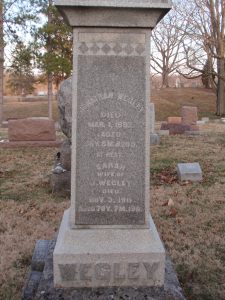
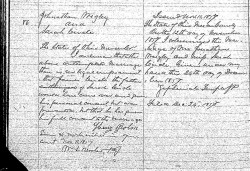
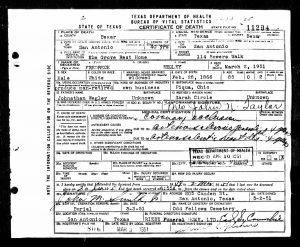
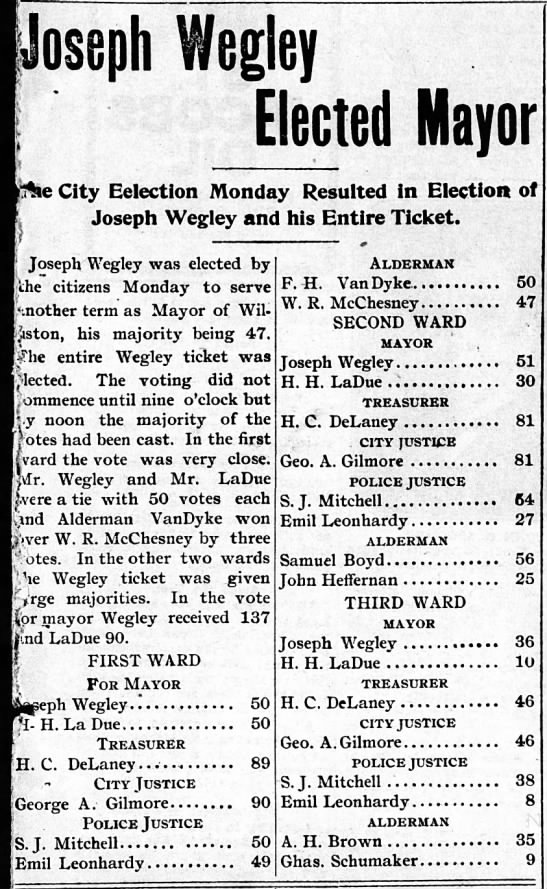
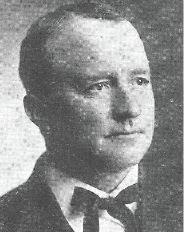
You must be logged in to post a comment.